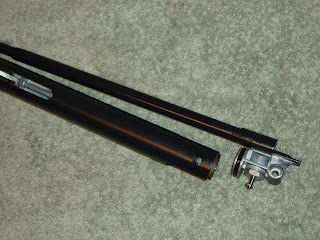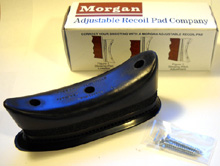Daisy got a new 717 barrel/valve assembly to me in only three days. Thanks Daisy! It arrived on Christmas Eve via first class USPS. I considered upgrading to the Lothar Walther barrel of the Model 747 but it was about $33 more dollars compared to the standard 717 barrel priced at only $17. Though, if you think about it, a Lothar Walther barrel for $50 is a good deal. Still, my 717 was broken and the outcome was unknown, so there wasn't much incentive to spend the extra coin.

Old barrel on top. There's a flat on the old barrel near the muzzle. New barrel has no flat yet retrofits just dandy.

A bit concerned when I saw the flakes of material in the leade. Was only some black paint flakes left from the masking. Came right off.

This is the original 717 valve seat. It was made for the early cone-shaped check valve. Daisy still uses this same casting but puts a small beveled edge on the hole. I didn't find any other differences in the valves.

Installed the new assembly and all seemed right in the world. The old stretched casting was indeed allowing the valve to move backward under pressure and leak through the breech slot in the compression tube.
A day later, I heard a tiny hiss as I charged the pistol. A much smaller leak than before but it was there.

I left a comment at the end of Part 2 to Bobby about making some shim washers...

Just cut them with a pair of snips from some thin scrap on the bench.

And installed them in the forward portion of the locater hole. The right side plate (Daisy's part number 717-10) has a protruding stud that fits into this hole. All the compressed air pushes against the stud. Like the original valve, the stud is apparently damaged slightly, too. Forced slightly backwards from an over extended pump assembly.

With the shims packed in the front of the hole, the valve is pushed slightly forward into the compression tube giving the o-ring more support. Talking about a few thousandths here. And that's all it took. Problem solved. I looked hard at the stud and really didn't find any obvious damage but it must be bent backwards ever so slightly. So there it is. I thought the gun had one problem with the check valve and the gun actually had three issues: bad check valve, stretched hole in the valve body and bent locater stud in the right side plate.
The gun chronographed consistently in the 360 fps range with .177 cal RWS Hobby pellets. After leaving the gun charged for 15 minutes, it clocked 362. If I do get another leak, I'll just stack one more shim in the hole. Ideally, the seal on the valve face would sit deeper inside the compression tube by another 0.050" or more. If so, the gun would likely never have developed the leaks that it did--even with the stretched holes in the valve.
I think the gun is a prime candidate for some custom grips. We'll see what happens.

















